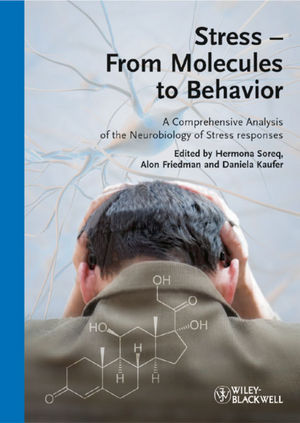Stress - From Molecules to Behavior: A Comprehensive Analysis of the Neurobiology of Stress ResponsesISBN: 978-3-527-32374-6
Hardcover
395 pages
December 2009, Wiley-Blackwell
 |
||||||
Hermona Soreq, PhD, professor of molecular biology and the elected Dean at the Faculty of Mathematics and Natural Sciences, The Hebrew University of Jerusalem is best known for her discovery of the molecular basis of mammalian stress reactions which increase the risk of chronic diseases such as anxiety and fear responses, muscle fatigue, inflammation and neurodegeneration. This, and the development of RNA-targeted oligonucleotide drugs limiting accumulation of stress-induced proteins, are fundamentally important at both neuroscience and genomic research levels. Prof. Soreq has authored over 400 scientific publications and has been awarded several prizes and honorary degrees at Stockholm, Buenos-Aires, Erlangen-Nuremberg and Beer-Sheva.
Daniela Kaufer earned a PhD from the Hebrew University of Jerusalem and completed post-doctoral training at Stanford University. She is an assistant professor in the Department of Integrative Biology at UC Berkley, and associated with the Helen Wills Neuroscience Institute, and the Berkeley Stem Cell Center. Current research in her lab focuses on hormonal regulation of adult hippocampal neurogenesis, and the regulation of gene expression and RNA processing (i.e., transcription regulation, RNA splicing and micro RNA) under stress, blood brain barrier injury and neurological insults. In her work Dr. Kaufer combines genomics, cellular and molecular imaging techniques, with physiological and behavioral tools.
Alon Friedman graduated from Ben-Gurion University of the Negev in 1992 after completing its MD-PhD program. He leads the laboratory for neurophysiology and experimental neurosurgery in Ben-Gurion University and Soroka University Medical Center. His research focuses on the pathophysiology of brain disorders, specifically on the effects of stress on the function of the neurovascular unit and the role of the blood-brain barrier in the pathophysiology of brain disorders. In his work Dr. Friedman combines clinical and basic research using molecular, imaging and neurophysiological approaches in both human patients and animal models.
Daniela Kaufer earned a PhD from the Hebrew University of Jerusalem and completed post-doctoral training at Stanford University. She is an assistant professor in the Department of Integrative Biology at UC Berkley, and associated with the Helen Wills Neuroscience Institute, and the Berkeley Stem Cell Center. Current research in her lab focuses on hormonal regulation of adult hippocampal neurogenesis, and the regulation of gene expression and RNA processing (i.e., transcription regulation, RNA splicing and micro RNA) under stress, blood brain barrier injury and neurological insults. In her work Dr. Kaufer combines genomics, cellular and molecular imaging techniques, with physiological and behavioral tools.
Alon Friedman graduated from Ben-Gurion University of the Negev in 1992 after completing its MD-PhD program. He leads the laboratory for neurophysiology and experimental neurosurgery in Ben-Gurion University and Soroka University Medical Center. His research focuses on the pathophysiology of brain disorders, specifically on the effects of stress on the function of the neurovascular unit and the role of the blood-brain barrier in the pathophysiology of brain disorders. In his work Dr. Friedman combines clinical and basic research using molecular, imaging and neurophysiological approaches in both human patients and animal models.



